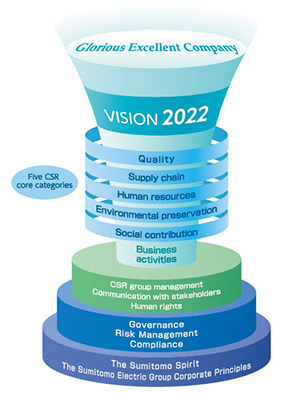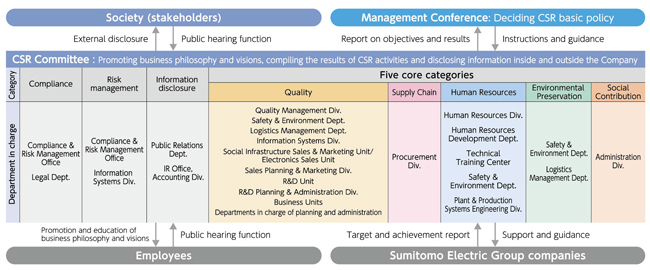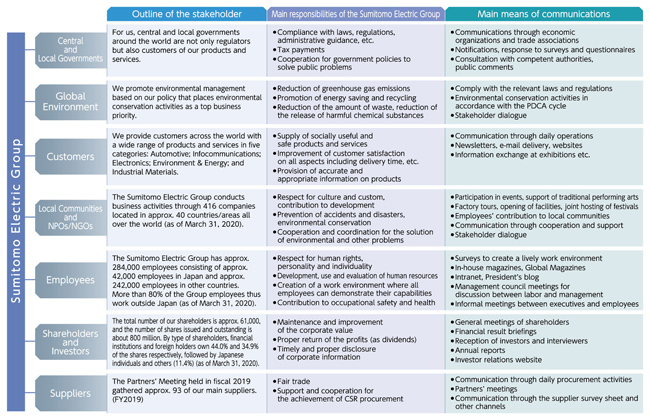CSR Basic Policy
Sumitomo Electric Group CSR Basic Policy

The Sumitomo Spirit, which gives top priority to social credibility and corporate ethics, is deeply instilled into the Sumitomo Electric Group. With the Sumitomo Spirit, as well as the Sumitomo Electric Group Corporate Principles, serving as the basic value standards that guide us, we will enhance our efforts for CSR management, communication with stakeholders and human rights while setting governance, risk management and compliance as the foundations. Then, through business activities based on them, we will create social values and contribute to a better society and environment.
In accordance with the establishment of VISION 2022 in fiscal 2018, we revised part of the CSR core categories. With "quality," "supply chain," human resources," "environmental preservation" and "social contribution" as the new five core categories, we will promote business activities.
We will fulfill our corporate social responsibility and establish good relationships with stakeholders with the aim of becoming a Glorious Excellent Company, i.e., realizing the ideal state of the Sumitomo Electric Group.
*Please see here for the Sumitomo Business Spirit and Sumitomo Electric Group Corporate Principles.
*Please see here for the “Glorious Excellent Company.”
*Please see here for the “VISION 2022”
The Origin of CSR
The Sumitomo Spirit encompasses the concept of corporate social responsibility.
The origin of Sumitomo dates back more than 400 years, with the Sumitomo Spirit serving as the underlying philosophy of its business operations. This corporate spirit advocates two business principles stated in the Rules Governing the House of Sumitomo established in 1882: “placing prime importance on integrity and sound management” and “pursuing profits by coping efficiently with changing times, while refraining from acting rashly and carelessly in pursuit of immediate temporary profits.” This spirit also embraces other traditional principles that have been passed down over generations, such as “attaching importance to technology,” “respect for human resources,” “long-range planning,” and “mutual prosperity, respect for the public good.”
Approximately one hundred years ago, Teigo Iba, the second Director General of Sumitomo, decided to relocate a copper smelting works in Besshi copper mine to an uninhabited island in the Seto Inland Sea, as a drastic solution to air pollution caused by sulfur dioxide gas generated from the refinery. A huge sum of money was invested in the relocation. Moreover, Iba started a reforestation project in the mountains of Besshi, which had been devastated by years of mining operations. To restore the natural environment, one million trees were planted every year. The third Sumitomo Director General, Masaya Suzuki, and his successors followed in Iba’s footsteps. Tree-planting activities became nationwide efforts. In 1939, a desulfurization and neutralization plant was constructed to offer an ultimate solution to cut smoke pollution.
The Sumitomo Spirit, which underlies these actions by successive directors, has been passed down from generation to generation as a common property of the Sumitomo Group, and shares common traits with the concept of CSR, which is today’s corporate buzzword.
Since its founding, Sumitomo Electric has consistently pursued business activities in harmony with society.
We at Sumitomo Electric have also upheld the Sumitomo Spirit as a basis of management. Since its founding in 1897, the Company has pursued harmony with society at all times and has carried out responsible business activities.
For instance, Sumitomo Electric fulfilled its corporate responsibility when the Great Kanto Earthquake hit Tokyo in 1923. Plants of electric wire manufacturers based in the Kanto region were devastated because of the earthquake, and prices of industrial materials such as copper increased sharply. As a key manufacturer capable of supplying electrical wires and cables, materials indispensable to post-quake reconstruction, we fulfilled our responsibility by offering these products at the same prices as before the disaster. Even in labor-management relations, the Company maintains these corporate principles of attaching importance to trust above all things and contributing to society in all circumstances. Learning lessons from the 1921 labor dispute, we decided to hold in-depth discussions between management and the union on any issue. By keeping subsequent agreements by all means, we have built a solid relationship of mutual confidence. As a result, we have never experienced another labor dispute up to today. To ensure sound corporate management, we make it a rule not to engage in speculative investments, such as the acquisition of real estates unrelated to our business operations. This policy has never been shaken even during the period of the Japanese economic bubble in the late 1980s.
Sumitomo Electric Group CSR Promotion System
In July 2004, Sumitomo Electric established the CSR Committee, which is chaired by the officer in charge of personnel and general administration and comprised by the managers of the departments in charge of CSR-related areas. The Committee set up CSR Promotion Office as its secretariat in July 2010 and conducts its activities as a cross-sectional organization to promote CSR initiatives in the Sumitomo Electric Group under the system shown in the figure below. The roles of the CSR Committee include:
- Holding semiannual meetings to review the CSR activities from a group-wide perspective and give support and guidance on the future development.
- Promotes internal and external information disclosure and public hearings on CSR.
- Promotes CSR education programs throughout the Sumitomo Electric Group, etc.
Stakeholders
The business operations of the Sumitomo Electric Group are supported by interaction with a wide range of stakeholders. We clarify our responsibilities for the stakeholders who have deep relationships with us on a daily basis, and continuously endeavor to promote communication with them through various opportunities.





